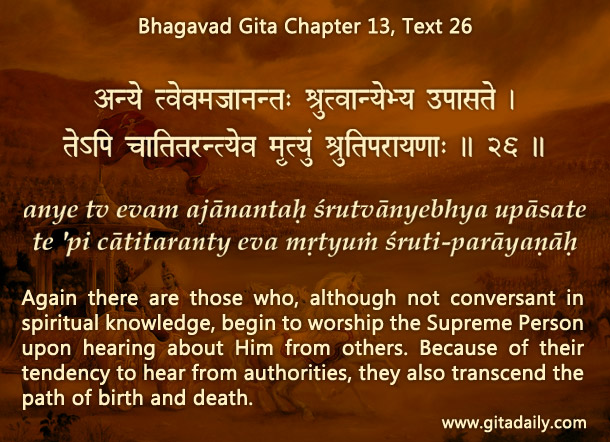The Bhagavad gita thirteenth chapter is its most philosophically dense chapter. How is all this philosophy relevant to Arjuna on the battlefield? What does the complex philosophy of the Gita’s thirteenth chapter mean for Arjuna?
To understand, we need to retrace the Gita’s flow. Arjuna’s major starting concern had been fear of karmic entanglement. To avoid such entanglement by developing detachment, he considered the sankhya worldview a valuable resource. Therefore, he asks about that worldview (13.01) to know how it fits into Krishna’s message in the Gita.
After explaining sankhya, Krishna concludes that those with the eyes of knowledge attain liberation (13.35). What is this knowledge? Among other things, it involves seeing how everyone is a soul and is always accompanied by the Supersoul (13.28) — and acting with that vision protects one from degradation and propels one toward the supreme destination (13.29). And this vision is the essence of the devotional vision too, with the addition of a loving bond between the soul and the Supreme. How can this knowledge be acquired? While Krishna mentions three separate processes in one verse (13.25), he devotes the next full verse (13.26) to bhakti-yoga, specifically to the bhakti-yoga limb of hearing. And Arjuna is already practicing this limb, for he is hearing from Krishna. Overall, Krishna conveys to Arjuna that he can get the eyes of knowledge, which is the purpose of sankhya analysis, by practicing bhakti-yoga.
How he can practice bhakti-yoga on the battlefield has already been mentioned earlier several times: do his duty of fighting while remembering Krishna (08.07); and fight as an instrument of the Divine (11.33). Thus, Krishna’s pointer toward devotional dutifulness makes this abstract chapter relevant for Arjuna.
One-sentence summary:
Krishna shows how the complex philosophy of the Gita’s thirteenth chapter harmonizes with his overall bhakti worldview, thereby reiterating through sankhya analysis his call to Arjuna for devotional action.
Think it over:
- Why does Arjuna ask about sankhya in the thirteenth chapter?
- What do Krishna’s statements about the means to gain knowledge imply for Arjuna?
- How is Krishna’s analysis of sankhya relevant for Arjuna?
***
13.26: Again there are those who, although not conversant in spiritual knowledge, begin to worship the Supreme Person upon hearing about Him from others. Because of their tendency to hear from authorities, they also transcend the path of birth and death.
To know more about this verse, please click on the image


Leave A Comment